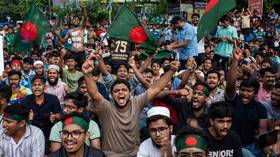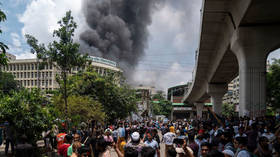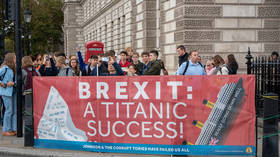India urged US to tone down pressure on ousted Bangladeshi PM – WaPo

Indian officials lobbied Washington to be lenient on former members of the Bangladeshi government, ruled by now-ousted leader Sheikh Hasina, a year before the political crisis which overthrew her administration erupted in the country, the Washington Post has reported, citing sources familiar with the matter.
In a series of meetings, Indian officials demanded that the US “dial down its pro-democratic rhetoric,” according to the newspaper. If the opposition were allowed to gain power, they argued, Bangladesh would become a breeding ground for Islamist groups and pose a threat to India’s national security, New Delhi reportedly warned.
The Biden administration had condemned the Hasina government for jailing political rivals and critics ahead of the country’s general election, which was held in January. The White House had also sanctioned the Rapid Action Battalion, an elite paramilitary force, as well as seven of its current and former officers, citing human-rights violations. Washington also threatened to impose visa restrictions on Bangladeshis who “undermined democracy” or committed “human rights abuses.” Although the US eventually softened its criticism of Bangladesh, Biden administration officials have denied that it was because of the Indian lobby, the report noted.
Hasina has reportedly claimed that she could have retained power if she had agreed to host a US military base in Bangladesh. A US State Department official has denied this, calling the notion “laughable.”
The Hasina-led Awami League party maintained robust ties with the Indian government led by Prime Minister Narendra Modi. Hasina, who held office for 15 years, fled to India after she resigned on August 5 following student protests over ‘discriminatory’ government job quotas benefitting relatives of veterans of the country’s liberation war in 1971. The country’s independence movement was led by Hasina’s father, Sheikh Mujibur Rahman.
An interim government, led by Nobel Peace Prize winner Muhammad Yunus, has been set up with the aim of restoring peace and stability in the strife-torn nation.
After Hasina’s ouster, Indian Prime Minister Narendra Modi expressed concern over alleged attacks on the minority Hindu community in the Muslim-dominated country. On Friday, Modi said on X (formerly Twitter) that he had spoken to Yunus on the phone, and the latter assured him of the safety and security of Hindus and other minority communities.
According to media reports, the Bangladesh National Hindu Grand Alliance has claimed that the community had faced attacks and threats at 278 locations across 48 districts since August 5 and called it an “assault” on Hindus. New Delhi has also set up a special committee to probe the alleged attacks and turbulence along its 4,000km-long land border with Bangladesh.













